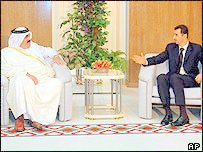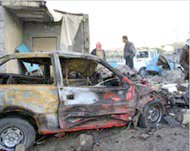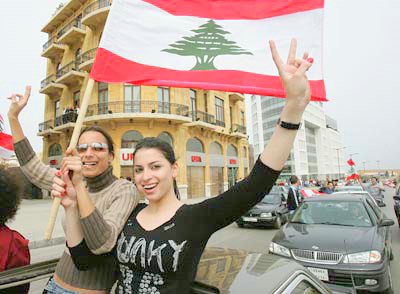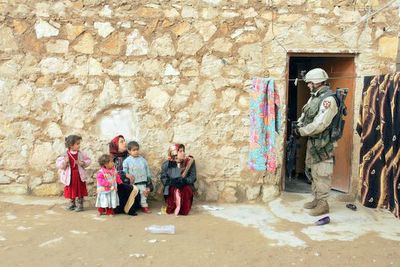Saturday, March 19, 2005
Wednesday, March 09, 2005
Coalition Forces Thwart Terrorists
American Forces Press Service
WASHINGTON, March 8, 2005 – Task Force Liberty soldiers killed two terrorists, wounded one and detained five after a terrorist attack near Dujayal in Salah Ad Din province March 7, Multinational Force Iraq reported today.
The wounded and detained were taken to a coalition forces base. Also on March 7, coalition forces killed one terrorist and injured two others during an operation in northern Iraq.
The forces intercepted terrorists at the same location where they had earlier seized a number of weapons in northern Mosul.
The injured were taken to a local hospital, and will be detained upon recovery.
No coalition injuries were reported during the operation. Elsewhere in Iraq on March 7, a small-arms attack on an Iraqi logistics convoy and the coalition patrol escorting it brought help from both Iraqi police units in the area and a quick-reaction force unit from the 3rd Infantry Division.
Three attackers were killed in the defense of the convoy and three vehicles confiscated.
Inside the vehicles, soldiers and Iraqi police found several weapons and munitions - including nine mortar rounds, a mortar launching tube, seven rocket-propelled grenades, two RPG launchers, a hand grenade, several hundred rounds of ammunition and a bayonet.
Officials described the joint response as an example of the mutual support between Iraqi and coalition forces.
In Mosul on March 5, coalition and Iraqi forces conducted several joint raids that resulted in the capture of 17 suspected insurgents and a large bounty of weapons and ammunition.
Elements of the Iraqi army and the police force’s emergency response unit joined coalition soldiers on the raids in Mosul that uncovered two separate caches. The largest included four anti-aircraft missiles, 116 RPGs, 11 RPG launchers, five AK-47 automatic rifles, more than 200,000 rounds of ammunition, several complete mortar systems of various sizes and several dozen rockets.
The caches also contained 225 blasting caps, 75 hand grenades, several hundred pounds of explosive propellant, four boxes of materials used for making improvised explosive devices, radios, telephones, night vision equipment, binoculars, a video camera and miscellaneous papers, to include mortar firing tables for Mosul.
(Based on Multinational Force Iraq and Multinational Security Transition Command Iraq news releases).
American Forces Press Service
WASHINGTON, March 8, 2005 – Task Force Liberty soldiers killed two terrorists, wounded one and detained five after a terrorist attack near Dujayal in Salah Ad Din province March 7, Multinational Force Iraq reported today.
The wounded and detained were taken to a coalition forces base. Also on March 7, coalition forces killed one terrorist and injured two others during an operation in northern Iraq.
The forces intercepted terrorists at the same location where they had earlier seized a number of weapons in northern Mosul.
The injured were taken to a local hospital, and will be detained upon recovery.
No coalition injuries were reported during the operation. Elsewhere in Iraq on March 7, a small-arms attack on an Iraqi logistics convoy and the coalition patrol escorting it brought help from both Iraqi police units in the area and a quick-reaction force unit from the 3rd Infantry Division.
Three attackers were killed in the defense of the convoy and three vehicles confiscated.
Inside the vehicles, soldiers and Iraqi police found several weapons and munitions - including nine mortar rounds, a mortar launching tube, seven rocket-propelled grenades, two RPG launchers, a hand grenade, several hundred rounds of ammunition and a bayonet.
Officials described the joint response as an example of the mutual support between Iraqi and coalition forces.
In Mosul on March 5, coalition and Iraqi forces conducted several joint raids that resulted in the capture of 17 suspected insurgents and a large bounty of weapons and ammunition.
Elements of the Iraqi army and the police force’s emergency response unit joined coalition soldiers on the raids in Mosul that uncovered two separate caches. The largest included four anti-aircraft missiles, 116 RPGs, 11 RPG launchers, five AK-47 automatic rifles, more than 200,000 rounds of ammunition, several complete mortar systems of various sizes and several dozen rockets.
The caches also contained 225 blasting caps, 75 hand grenades, several hundred pounds of explosive propellant, four boxes of materials used for making improvised explosive devices, radios, telephones, night vision equipment, binoculars, a video camera and miscellaneous papers, to include mortar firing tables for Mosul.
(Based on Multinational Force Iraq and Multinational Security Transition Command Iraq news releases).
Coalition Forces Thwart Terrorists
American Forces Press Service
WASHINGTON, March 8, 2005 – Task Force Liberty soldiers killed two terrorists, wounded one and detained five after a terrorist attack near Dujayal in Salah Ad Din province March 7, Multinational Force Iraq reported today.
The wounded and detained were taken to a coalition forces base. Also on March 7, coalition forces killed one terrorist and injured two others during an operation in northern Iraq.
The forces intercepted terrorists at the same location where they had earlier seized a number of weapons in northern Mosul.
The injured were taken to a local hospital, and will be detained upon recovery.
No coalition injuries were reported during the operation. Elsewhere in Iraq on March 7, a small-arms attack on an Iraqi logistics convoy and the coalition patrol escorting it brought help from both Iraqi police units in the area and a quick-reaction force unit from the 3rd Infantry Division.
Three attackers were killed in the defense of the convoy and three vehicles confiscated.
Inside the vehicles, soldiers and Iraqi police found several weapons and munitions - including nine mortar rounds, a mortar launching tube, seven rocket-propelled grenades, two RPG launchers, a hand grenade, several hundred rounds of ammunition and a bayonet.
Officials described the joint response as an example of the mutual support between Iraqi and coalition forces.
In Mosul on March 5, coalition and Iraqi forces conducted several joint raids that resulted in the capture of 17 suspected insurgents and a large bounty of weapons and ammunition.
Elements of the Iraqi army and the police force’s emergency response unit joined coalition soldiers on the raids in Mosul that uncovered two separate caches. The largest included four anti-aircraft missiles, 116 RPGs, 11 RPG launchers, five AK-47 automatic rifles, more than 200,000 rounds of ammunition, several complete mortar systems of various sizes and several dozen rockets.
The caches also contained 225 blasting caps, 75 hand grenades, several hundred pounds of explosive propellant, four boxes of materials used for making improvised explosive devices, radios, telephones, night vision equipment, binoculars, a video camera and miscellaneous papers, to include mortar firing tables for Mosul.
(Based on Multinational Force Iraq and Multinational Security Transition Command Iraq news releases).
American Forces Press Service
WASHINGTON, March 8, 2005 – Task Force Liberty soldiers killed two terrorists, wounded one and detained five after a terrorist attack near Dujayal in Salah Ad Din province March 7, Multinational Force Iraq reported today.
The wounded and detained were taken to a coalition forces base. Also on March 7, coalition forces killed one terrorist and injured two others during an operation in northern Iraq.
The forces intercepted terrorists at the same location where they had earlier seized a number of weapons in northern Mosul.
The injured were taken to a local hospital, and will be detained upon recovery.
No coalition injuries were reported during the operation. Elsewhere in Iraq on March 7, a small-arms attack on an Iraqi logistics convoy and the coalition patrol escorting it brought help from both Iraqi police units in the area and a quick-reaction force unit from the 3rd Infantry Division.
Three attackers were killed in the defense of the convoy and three vehicles confiscated.
Inside the vehicles, soldiers and Iraqi police found several weapons and munitions - including nine mortar rounds, a mortar launching tube, seven rocket-propelled grenades, two RPG launchers, a hand grenade, several hundred rounds of ammunition and a bayonet.
Officials described the joint response as an example of the mutual support between Iraqi and coalition forces.
In Mosul on March 5, coalition and Iraqi forces conducted several joint raids that resulted in the capture of 17 suspected insurgents and a large bounty of weapons and ammunition.
Elements of the Iraqi army and the police force’s emergency response unit joined coalition soldiers on the raids in Mosul that uncovered two separate caches. The largest included four anti-aircraft missiles, 116 RPGs, 11 RPG launchers, five AK-47 automatic rifles, more than 200,000 rounds of ammunition, several complete mortar systems of various sizes and several dozen rockets.
The caches also contained 225 blasting caps, 75 hand grenades, several hundred pounds of explosive propellant, four boxes of materials used for making improvised explosive devices, radios, telephones, night vision equipment, binoculars, a video camera and miscellaneous papers, to include mortar firing tables for Mosul.
(Based on Multinational Force Iraq and Multinational Security Transition Command Iraq news releases).
Monday, March 07, 2005
My truth (La mia verità) - Riveting.
By Giuliana Sgrena
Mar 7, 2005, 18:49
Email this article
Printer friendly page
March 6, 2005 — I am still in the darkness. Last Friday was the most dramatic day of my life since I was abducted.
I had just spoken with my abductors, who for days kept telling me I would be released. So I was living in wait. They said things that I would understand only later. They talked of transfer related problems. I had learned to understand which way the wind blew from the attitude of my two "sentinels," the two fellows who watched over me every day—especially one of them, who attended to my requests, was incredibly bold. In the attempt to understand what was going on, I provocatively asked him if he was happy because I would go away or because I would stay. I was surprised and happy when, for the first time, he told me, "I only know you will go, but I don't know when."
To confirm that something new was happening, at one point they both came in the room to reassure me and joke: "Congratulations," they said, "you are leaving for Rome." To Rome, that's what they were saying.
I had a weird feeling, because that word immediately evoked liberation but also projected a void inside myself. I realized it was the most difficult moment of my abduction and that if all I had lived yet was certain, now an abyss of heavy uncertainties was widening. I changed my clothes.
They came back: "We'll escort you, but don't give signals of your presence, otherwise the Americans might intervene." That was not what wanted to hear. It was the happiest and also the most dangerous moment. If we ran into someone, meaning American troops, there would be an exchange of fire, and my captors were ready and they would have responded. I had to have my eyes covered. I was already getting used to a temporary blindness.
About what happened outside, I only knew that in Baghdad it had rained. The car ran safely in a muddy area. There was the driver and the same old abductors. I soon heard something I didn't want to hear. A helicopter flying low over the area we had stopped in. "Don't worry, now they will come look for you . . . within ten minutes they will come." They had spoken Arabic all the time, some French and much broken English. Now they spoke in this way, too.
Then they got out of the car. I stayed in that condition of immobility and blindness. My eyes were stuffed with cotton, and covered by sunglasses. I was motionless. I thought . . . what do I do? Should I start counting the passing seconds to another condition, the one of freedom? I had just started counting when I heard a friendly voice: "Giuliana, Giuliana, this is Nicola, don't worry, I've talked to Gabriele Polo, don't worry, you're free."
He took my cotton blindfold and sunglasses off. I felt relieved, not for what was going on, which I didn't understand, but for Nicola's words. He kept talking nonstop, he was uncontainable, a flood of friendly words and jokes. I finally found comfort, almost physically, a warm comfort I had long since forgotten.
The car proceeded on its way, through an underpass full of puddles, almost skidding to avoid them. We engaged in incredible laughter. It was relieving. Skidding along a road full of water in Baghdad and maybe have a bad car crash after all I had experienced would not be really explainable. Nicola Calipari sat by my side. The driver had notified the embassy and Italy twice that we were heading to the airport, which I knew was controlled by the American troops. It was less than one kilometre, they told me . . . when. . . . I remember only fire. At that point a rain of fire and bullets came at us, forever silencing the happy voices from a few minutes earlier.
The driver started shouting we were Italians, "We are Italians! We are Italians . . ." Nicola Calipari dove on top of me to protect me and immediately, and I mean immediately, I felt his last breath as he died on me. I must have felt physical pain, I didn't know why. But I had a sudden thought: I recalled my abductors' words. They said they were deeply committed to releasing me, but that I had to be careful because "the Americans don't want you to return." Back then, as soon as they had said that, I had judged their words to be meaningless and ideological. In that moment such words risked to take the taste of the most bitter truth away. I can't tell the rest yet.
This was the most dramatic moment. But the month I spent as a kidnap victim has probably changed my life forever. One month alone with myself, prisoner of my deepest belief. Each hour was a pitiless test of my work. Sometimes they kidded me. They even asked me why I would leave and asked me to stay. I pointed out that I had personal relationships. They led me to think to such priorities that too often we put aside.
"Ask for your husband's help," they told me. And I did so in the first video, the one I think you all have watched. My life has changed. Same as Ra'ad Ali Abdulaziz's, the Iraqi engineer from "Un Ponte per" who was abducted with Simona & Simona. "My life is no longer the same," he told me. I didn't understand. Now I know what he meant. Because I have experienced the hardness of the truth, I realize the difficulty of communicating it, and the weakness of trying to.
In the first days of my abduction I didn't shed a single tear. I was simply mad. I told them directly: "How can you abduct me, if I am against the war?" And they started a fierce debate. "Yes, because you want to speak to the people, we would never abduct a reporter who stays shut in the hotel. And then the fact you say you're against the war could be a cover up." I would reply, almost provoking them: "It's easy to abduct a weak woman like me, why don't you do it to the American officers?" I insisted that they couldn't ask the Italian government to withdraw its troops; that they had to address the Italian people who were and are against the war, not Italian government.
It was a month of ups and downs, moments of hope and moments of deep depression. Like when the first Sunday after my abduction, in the Baghdad house where I was prisoner and where there was a satellite television dish, they let me see the EuroNews. I saw my poster on the Rome city hall building. I was relieved. Soon after, however, a claim from the Jihad announced I would be executed if Italy didn't withdraw its troops. I was frightened. But they reassured me that it wasn't them, that people should have mistrusted those proclamations, that they were a "provocation." I often asked the one who seemed more approachable and who looked more like a soldier: "Tell me the truth, you will kill me". Nonetheless, many times, we talked. "Come see a movie on TV," they told me, while a Wahhabi woman, covered from head to foot, hung around the house taking care of me.
The abductors seemed a very religious group, constantly praying the Koran verses. But on Friday, at the time of my release, the one who seemed the most religious and who used to wake up at 5 o'clock every morning to pray, "congratulated" me and incredibly shook my hand—it is not a usual behaviour for an Islamic fundamentalist—adding "If you behave, you'll leave soon." That was followed by a rather humorous episode. One of my two guards came to me astonished because the TV showed my photographs displayed in European towns and also on Totti. Yes, Totti (the Rome football team player, T.N.). The guard said he said he was a Rome team fan and he was amazed that his favourite player had taken to field with "Free Giuliana" on his T-shirt.
I now live with no more certainties. I find myself deeply weak. I failed in my belief. I had always claimed there was need to go tell about that dirty war. And I had to decide whether to stay in the hotel or going out and chance being abducted because of my work. "We don't want anyone any more," the abductors told me. But I wanted to tell about the bloodbath in Falluja through the refugees' tales. And that morning the refugees and some of their "leaders" didn't listen to me. I had in front of me the evidence of what the Iraqi society has become with the war and they threw their truth in my face: "We don't want anyone. Why don't you stay home? What such interview can be useful for?". The worst collateral damage, the war killing communication, was falling on me. On me, who had risked it all, challenging the Italian government that didn't want reporters gong to Iraq, and the Americans who don't want our work that gives witness to what that country has really turned into with the war, despite what they call elections.
Now I wonder. Is their refusal a failure?
This article was orinally published in Il Manifesto and translated by Eva Milan, ZabrinskyPoint
By Giuliana Sgrena
Mar 7, 2005, 18:49
Email this article
Printer friendly page
March 6, 2005 — I am still in the darkness. Last Friday was the most dramatic day of my life since I was abducted.
I had just spoken with my abductors, who for days kept telling me I would be released. So I was living in wait. They said things that I would understand only later. They talked of transfer related problems. I had learned to understand which way the wind blew from the attitude of my two "sentinels," the two fellows who watched over me every day—especially one of them, who attended to my requests, was incredibly bold. In the attempt to understand what was going on, I provocatively asked him if he was happy because I would go away or because I would stay. I was surprised and happy when, for the first time, he told me, "I only know you will go, but I don't know when."
To confirm that something new was happening, at one point they both came in the room to reassure me and joke: "Congratulations," they said, "you are leaving for Rome." To Rome, that's what they were saying.
I had a weird feeling, because that word immediately evoked liberation but also projected a void inside myself. I realized it was the most difficult moment of my abduction and that if all I had lived yet was certain, now an abyss of heavy uncertainties was widening. I changed my clothes.
They came back: "We'll escort you, but don't give signals of your presence, otherwise the Americans might intervene." That was not what wanted to hear. It was the happiest and also the most dangerous moment. If we ran into someone, meaning American troops, there would be an exchange of fire, and my captors were ready and they would have responded. I had to have my eyes covered. I was already getting used to a temporary blindness.
About what happened outside, I only knew that in Baghdad it had rained. The car ran safely in a muddy area. There was the driver and the same old abductors. I soon heard something I didn't want to hear. A helicopter flying low over the area we had stopped in. "Don't worry, now they will come look for you . . . within ten minutes they will come." They had spoken Arabic all the time, some French and much broken English. Now they spoke in this way, too.
Then they got out of the car. I stayed in that condition of immobility and blindness. My eyes were stuffed with cotton, and covered by sunglasses. I was motionless. I thought . . . what do I do? Should I start counting the passing seconds to another condition, the one of freedom? I had just started counting when I heard a friendly voice: "Giuliana, Giuliana, this is Nicola, don't worry, I've talked to Gabriele Polo, don't worry, you're free."
He took my cotton blindfold and sunglasses off. I felt relieved, not for what was going on, which I didn't understand, but for Nicola's words. He kept talking nonstop, he was uncontainable, a flood of friendly words and jokes. I finally found comfort, almost physically, a warm comfort I had long since forgotten.
The car proceeded on its way, through an underpass full of puddles, almost skidding to avoid them. We engaged in incredible laughter. It was relieving. Skidding along a road full of water in Baghdad and maybe have a bad car crash after all I had experienced would not be really explainable. Nicola Calipari sat by my side. The driver had notified the embassy and Italy twice that we were heading to the airport, which I knew was controlled by the American troops. It was less than one kilometre, they told me . . . when. . . . I remember only fire. At that point a rain of fire and bullets came at us, forever silencing the happy voices from a few minutes earlier.
The driver started shouting we were Italians, "We are Italians! We are Italians . . ." Nicola Calipari dove on top of me to protect me and immediately, and I mean immediately, I felt his last breath as he died on me. I must have felt physical pain, I didn't know why. But I had a sudden thought: I recalled my abductors' words. They said they were deeply committed to releasing me, but that I had to be careful because "the Americans don't want you to return." Back then, as soon as they had said that, I had judged their words to be meaningless and ideological. In that moment such words risked to take the taste of the most bitter truth away. I can't tell the rest yet.
This was the most dramatic moment. But the month I spent as a kidnap victim has probably changed my life forever. One month alone with myself, prisoner of my deepest belief. Each hour was a pitiless test of my work. Sometimes they kidded me. They even asked me why I would leave and asked me to stay. I pointed out that I had personal relationships. They led me to think to such priorities that too often we put aside.
"Ask for your husband's help," they told me. And I did so in the first video, the one I think you all have watched. My life has changed. Same as Ra'ad Ali Abdulaziz's, the Iraqi engineer from "Un Ponte per" who was abducted with Simona & Simona. "My life is no longer the same," he told me. I didn't understand. Now I know what he meant. Because I have experienced the hardness of the truth, I realize the difficulty of communicating it, and the weakness of trying to.
In the first days of my abduction I didn't shed a single tear. I was simply mad. I told them directly: "How can you abduct me, if I am against the war?" And they started a fierce debate. "Yes, because you want to speak to the people, we would never abduct a reporter who stays shut in the hotel. And then the fact you say you're against the war could be a cover up." I would reply, almost provoking them: "It's easy to abduct a weak woman like me, why don't you do it to the American officers?" I insisted that they couldn't ask the Italian government to withdraw its troops; that they had to address the Italian people who were and are against the war, not Italian government.
It was a month of ups and downs, moments of hope and moments of deep depression. Like when the first Sunday after my abduction, in the Baghdad house where I was prisoner and where there was a satellite television dish, they let me see the EuroNews. I saw my poster on the Rome city hall building. I was relieved. Soon after, however, a claim from the Jihad announced I would be executed if Italy didn't withdraw its troops. I was frightened. But they reassured me that it wasn't them, that people should have mistrusted those proclamations, that they were a "provocation." I often asked the one who seemed more approachable and who looked more like a soldier: "Tell me the truth, you will kill me". Nonetheless, many times, we talked. "Come see a movie on TV," they told me, while a Wahhabi woman, covered from head to foot, hung around the house taking care of me.
The abductors seemed a very religious group, constantly praying the Koran verses. But on Friday, at the time of my release, the one who seemed the most religious and who used to wake up at 5 o'clock every morning to pray, "congratulated" me and incredibly shook my hand—it is not a usual behaviour for an Islamic fundamentalist—adding "If you behave, you'll leave soon." That was followed by a rather humorous episode. One of my two guards came to me astonished because the TV showed my photographs displayed in European towns and also on Totti. Yes, Totti (the Rome football team player, T.N.). The guard said he said he was a Rome team fan and he was amazed that his favourite player had taken to field with "Free Giuliana" on his T-shirt.
I now live with no more certainties. I find myself deeply weak. I failed in my belief. I had always claimed there was need to go tell about that dirty war. And I had to decide whether to stay in the hotel or going out and chance being abducted because of my work. "We don't want anyone any more," the abductors told me. But I wanted to tell about the bloodbath in Falluja through the refugees' tales. And that morning the refugees and some of their "leaders" didn't listen to me. I had in front of me the evidence of what the Iraqi society has become with the war and they threw their truth in my face: "We don't want anyone. Why don't you stay home? What such interview can be useful for?". The worst collateral damage, the war killing communication, was falling on me. On me, who had risked it all, challenging the Italian government that didn't want reporters gong to Iraq, and the Americans who don't want our work that gives witness to what that country has really turned into with the war, despite what they call elections.
Now I wonder. Is their refusal a failure?
This article was orinally published in Il Manifesto and translated by Eva Milan, ZabrinskyPoint
Thursday, March 03, 2005
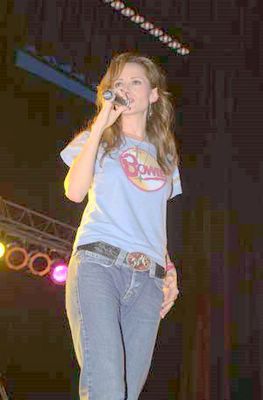
Country music singer Chely Wright performs a free concert for Marines at the base theatre for Marines prior to their deployment.
The Single Marine Program helped orchestrate the event with the famed country star. I think the fact that Mrs. Wright came down here after playing last night in Morehead City says a lot about her character, said Renee Voldov, SMP coordinator.
Photo by: Lance Cpl. Christopher S. Vega
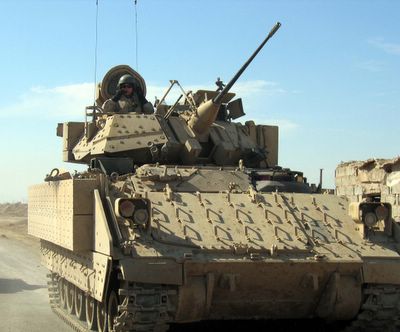
Army Sgt. 1st Class Patrick Sandel patrols in his Bradley fighting vehicle. The 3rd Battalion, 156th Infantry Regiment, soldier is serving in Iraq with the 1st Battalion, 156th Regiment, of the 256th Brigade Combat Team, and has survived 19 bomb and mortar attacks. Photo by Command Sgt. Maj. Steven Stuckey, USA
Wednesday, March 02, 2005
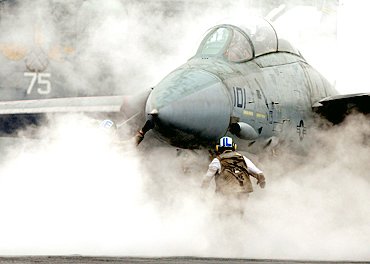
FINAL INSPECTION U.S. Navy sailors begin a final inspection on an F-14B Tomcat, assigned to the Swordsmen of Fighter Squadron 32, prior to launching off the flight deck of the aircraft carrier USS Harry S. Truman in the Persian Gulf, Feb. 22, 2005. The Truman Carrier Strike Group is on a regularly scheduled deployment in support of the global war on terrorism. U.S. Navy photo by Airman Ryan O'Connor Hi-Res Photo
